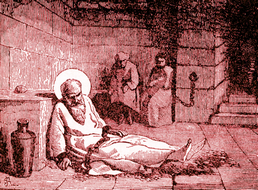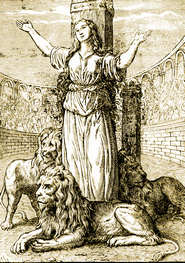Lives of the Saints
Our Models and Protectors
Spiritual Bouquet:
June 2

Saints Pothinus, Sanctus, Attalus, Blandina
and Forty-Eight other Martyrs of Lyons
(† 177)
After a miraculous victory obtained by the prayers of a Christian legion under Marcus Aurelius in 174, the Church was enjoying a kind of peace, which was nonetheless often disturbed in various places by popular commotions, or by the superstitious fury of pagan governors. These factors become evident in the persecution which was raised at Vienne and Lyons in 177, three years after the victory of the legion. Saint Pothinus was then Bishop of Lyons, and Saint Irenaeus, still a young priest, had recently come to Lyons with several other Christians, sent from Asia Minor by Saint Polycarp; soon Irenaeus would replace Saint Pothinus.
The Christians of the region were forbidden to frequent the baths and the forum, and they were tracked everywhere, becoming the subject of popular uprisings, stonings, outrages and imprisonments. A justly famous letter attributed to Saint Irenaeus, addressed by the churches of Lyons and Vienne to their mother-church in Asia, narrates in detail the martyrdom of these heroic Christians. The citations which follow are from that letter.
Many of the principal Christians were brought before the Roman governor. Saint Pothinus himself was ninety years old, weak and infirm; in fact he could scarcely talk, but his zeal and desire for martyrdom sustained him. He was taken, or rather carried, to the tribunal amidst insults... The governor asked him who the god of the Christians was: You will know Him if you are worthy of it, he replied. The multitude became furious; those around him struck him with their hands and feet, showing no respect for his age; those farther away threw at him everything they could find, imagining they were avenging their gods. The holy bishop scarcely had a breath of life left when he was thrown into prison, where he expired soon afterwards.

With Attalus, a deacon who was always the pillar and support of our church, three martyrs were subjected to cruel torture for two days in the amphitheatre, as a diversion for the people. One was a young slave, Blandina; her mistress, also a Christian, feared she would lack strength to brave the torture. But when she was tormented, suspended from a cross, tossed about by a bull, she bore it all with joy, until the executioners gave up, confessing themselves outdone. She was the last one to die after a glorious combat. The letter says: Like a generous mother who, having inspired her children during the combat, has sent them victorious ahead of her to the King of Glory, she was rejoicing at being about to join them in the heavens. She bore the series of tortures with so radiant a joy, that one would have said she was invited to a wedding feast rather than condemned to the lions...
Human language could not describe the tortures that the Saints were made to endure, in the hope of making them admit the impious things we were charged with. They had been accused of eating human flesh. Red-hot plates were held to the sides of Sanctus, a deacon of Vienne, until his body became one great sore, and he no longer looked like a man; but amidst his tortures he said to his tormentors that it was such torments which consumed human flesh, whereas Christians did no harm to their fellow men. The letter says he was strengthened by the stream of heavenly water which flows from the side of Christ.
In the meantime, many confessors were kept in prison, and among them were some who had been terrified into apostasy. Even the pagans could perceive in the Christians the joy of martyrdom, contrasting with the misery of the apostates. But the faithful confessors brought back all but one of those who had fallen, and the Church rejoiced when she saw her children live again in Christ. Some died in prison, the rest were martyred one by one, giving their God their blood in loving exchange for His.
Les Petits Bollandistes: Vies des Saints, by Msgr. Paul Guérin (Bloud et Barral: Paris, 1882), Vol. 6; Little Pictorial Lives of the Saints, a compilation based on Butler's Lives of the Saints, and other sources by John Gilmary Shea (Benziger Brothers: New York, 1894).